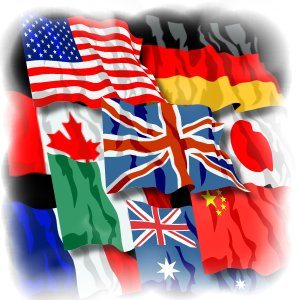 World politics
World politics. The 20th century witnessed the outcome of two world wars and not only the rise and fall of the Third Reich but also the rise and fall of communism. The development of the Atomic bomb gave the United States a more rapid end to its conflict in Japan in World War II. Later, the development of the Hydrogen bomb became the ultimate weapon of mass destruction. The United Nations has served as a forum for peace in a world threatened by nuclear war. "The invention of nuclear and space weapons has made war unacceptable as an instrument for achieving political ends."
Although an all-out final nuclear holocaust is out of the question for man, "nuclear blackmail" comes into question not only on the issue of world peace but also on the issue of national sovereignty. On a Sunday in 1962, the world stood still at the brink of nuclear war during the October Cuban missile crisis from the implementation of U.S. vs U.S.S.R. nuclear blackmail policy.
Authoritarian - libertarian politics
Authoritarianism and libertarianism refer to the amount of individual freedom each person possesses in that society relative to the state. One author describes authoritarian political systems as those where "individual rights and goals are subjugated to group goals, expectations and conformities", while libertarians generally oppose the state and hold the individual and his property as sovereign. In their purest form, libertarians are anarchists, who argue for the total abolition of the state, while the purest authoritarians are totalitarians who support state control over all aspects of society.
For instance, classical liberalism (also known as laissez-faire liberalism, or, in much of the world, simply liberalism) is a doctrine stressing individual freedom and limited government. This includes the importance of human rationality, individual property rights, free markets, natural rights, the protection of civil liberties, constitutional limitation of government, and individual freedom from restraint as exemplified in the writings of John Locke, Adam Smith, David Hume, David Ricardo, Voltaire, Montesquieu and others. According to the libertarian Institute for Humane Studies, "the libertarian, or 'classical liberal,' perspective is that individual well-being, prosperity, and social harmony are fostered by 'as much liberty as possible' and 'as little government as necessary.
Left-right politics
Recently in history, political analysts and politicians divide politics into left wing and right wing politics, often also using the idea of center politics as a middle path of policy between the right and left. This classification is comparatively recent (it was not used by Aristotle or Hobbes, for instance), and dates from the French Revolution era, when those members of the National Assembly who supported the republic, the common people and a secular society sat on the left and supporters of the monarchy, aristocratic privilege and the Church sat on the right.
The meanings behind the labels have become more complicated over the years. A particularly influential event was the publication of the Communist Manifesto by Karl Marx and Frederick Engels in 1848. The Manifesto suggested a course of action for a proletarian revolution to overthrow the bourgeois society and abolish private property, in the belief that this would lead to a classless and stateless society.
The meaning of left-wing and right-wing varies considerably between different countries and at different times, but generally speaking, it can be said that the right wing often values tradition and social stratification while the left wing often values reform and egalitarianism, with the center seeking a balance between the two such as with social democracy or regulated capitalism.
According to Norberto Bobbio, one of the major exponents of this distinction, the Left believes in attempting to eradicate social inequality, while the Right regards most social inequality as the result of ineradicable natural inequalities, and sees attempts to enforce social equality as utopian or authoritarian.
Some ideologies, notably Christian Democracy, claim to combine left and right wing politics; according to Geoffrey K. Roberts and Patricia Hogwood, "In terms of ideology, Christian Democracy has incorporated many of the views held by liberals, conservatives and socialists within a wider framework of moral and Christian principles." Movements which claim or formerly claimed to be above the left-right divide include Fascist Terza Posizione economic politics in Italy, Gaullism in France, Peronism in Argentina, and National Action Politics in Mexico. (http://en.wikipedia.org)
 Shortly after delivering his speech at the State Department, for 45 minutes to support the establishment of a Palestinian state with borders before the 1967 war, now the U.S. president has reversed course and firmly reject the establishment of a Palestinian state. With a very fundamental change of attitude showed identities of U.S. President Barack Obama. Obama is subject to Zionist Israel.
Shortly after delivering his speech at the State Department, for 45 minutes to support the establishment of a Palestinian state with borders before the 1967 war, now the U.S. president has reversed course and firmly reject the establishment of a Palestinian state. With a very fundamental change of attitude showed identities of U.S. President Barack Obama. Obama is subject to Zionist Israel.




 00:24
00:24
 About Website
About Website







